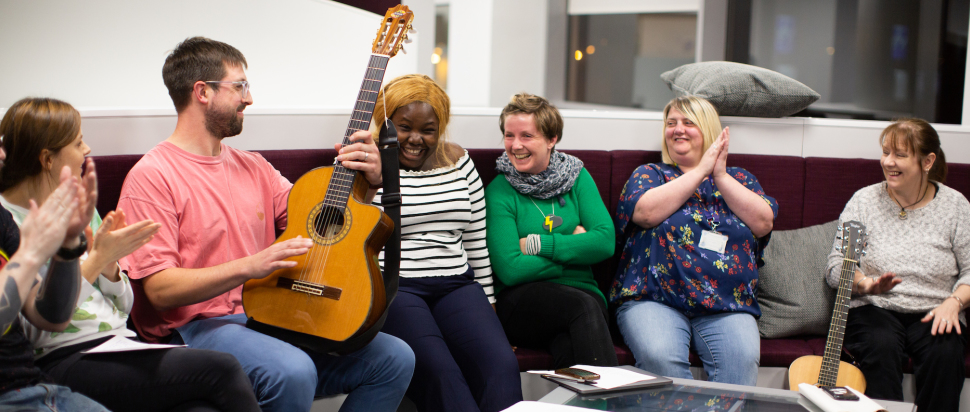Yours Forever: Ensemble on No Place Like It
Ahead of the release of No Place Like It, we speak with some of the musicians and young people involved in the award-winning Glasgow-based songwriting project Ensemble
“I’ve always wanted to have something that’s just mine,” says 20-year-old Megan Kay. Since autumn last year, she’s been participating in Ensemble, a Glasgow-based project which engages young people in social care – many of whom have experience of mental health issues and homelessness – with songwriting and music-making workshops alongside professional artists. “When you’ve made a song, it’s yours forever.”
Established in 2016 for people aged 16-25, supported by the Wheatley Care group, and funded initially by See Me Scotland and, more recently, Creative Scotland’s Youth Music Initiative, Ensemble has become something much more. Weekly meet-ups to create and share songs have culminated in two packed live shows at St Luke’s (Songs to End Mental Health Stigma in 2017, and Songs to End Homelessness in 2019), and now the upcoming release of an album, No Place Like It. The songs for the album were collaboratively written in three six-week songwriting blocks alongside Jill O’Sullivan, Martha Ffion, Jonnie Common and a cohort of Scottish artists.
“The idea was to provide the opportunity to be involved in something creative, and was established with the help of the young people it would benefit. It was a music-based outlet that came out on top,” says Michael Timmons, a musician and songwriter who helped get Ensemble off the ground, and continues to work within it as a volunteer. “What we soon discovered was – and this wasn’t surprising – the overwhelming sense of achievement that comes from writing a fully realised song, and being part of a community, far outweighed anything we could ever have imagined.”
Donna Maciocia, also a songwriter and musician, is Ensemble’s current project coordinator and creative lead, and has been involved in making connections with the young people engaged in the process as well as using 20 years of industry experience to populate a network of volunteers and musicians with the attributes to make the project a success.
“A lot of the young people are terrified at the prospect at first, but eventually have the courage to come along to a workshop,” says Macocia. “We start on week one with nothing, and use tried and tested songwriting exercises that help people with no experience of something like this just suddenly generate ideas out of nothing. We had great success with David Bowie’s cut-up technique, and pinning pictures all over walls in our meet-up space to evoke responses. That’s such a great way to liberate yourself from that voice in your head that tells you you're not good at things.”
After engaging over 50 participants over the course of its last two rounds of funding, all those involved in Ensemble settled on an uplifting, genre-defying selection of songs for public release, some of which were recorded at Chem19 studios and others remotely since the coronavirus lockdown. The fact that there is little to discern between the two sets of recordings is testament to the impressive writing and production that has resulted. “You are expressing something personal to you and having that fed back to you in a really professional way, that sounds good,” says Timmons. “The impact of that can’t be understated.”
As well as Megan, The Skinny spoke to two other Ensemble participants: Andrew Sinclair (23), who has gained a reputation as an “omnichord god” thanks to his playing of the instrument at the last St Luke’s gig, and Shobhita (26), who contributed writing to the album track Glittery Bums, a tribute to women seeking asylum in Glasgow – in keeping with the collection’s stories of home and community. As with all Ensemble participants, they see the songs they’ve written as an artistic rendering of personal experiences they may otherwise find too difficult to explore.
“There’s no pressure on how much you want to say or share,” says Shobhita. “I don’t always even remember specific details – it’s the emotions that stick with you throughout your life. These experiences are sometimes difficult to process and when you think about it deeply, you spend a lot of time overthinking and it doesn't always work out well. Somehow just having to think about it emotionally in the context of making a song eases everything.”
Sinclair adds: “The last song I wrote was my way of speaking about my problems without speaking about them directly. I was doubting myself and the things I can do. It’s taking what problems you've got and just throwing them in the mix with other people – it’s like fireworks, it just works.”
On working with the young participants, Macocia says: “There’s a joyfulness. Although each person can be sharing really harrowing, difficult stories, there's a beauty and uninhibitedness in that sharing. Young people have this courage that older adults I work with in other settings don't have. And it makes me, as an older musician, and the freelancers and musicians involved, so inspired. That enthusiasm and willingness to be vulnerable is infectious.”
Ensemble has persisted with 19 participants since the pandemic hit, with workshops being conducted online. Megan’s experience of the project, which she only knows in this form, shows that none of its effect has been diminished. “It felt so good to kind of just be like well ‘this is me’,” she says about sharing her latest song with the wider group. “It’s something I can be proud of. I keep listening to my songs and smiling – I don’t do that very often.”
No Place Like It is released on 30 Apr, available from ensemblesongwriting.bandcamp.com
More information on Wheatley Care and the work they do can be found at wheatley-care.com
